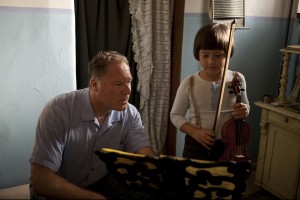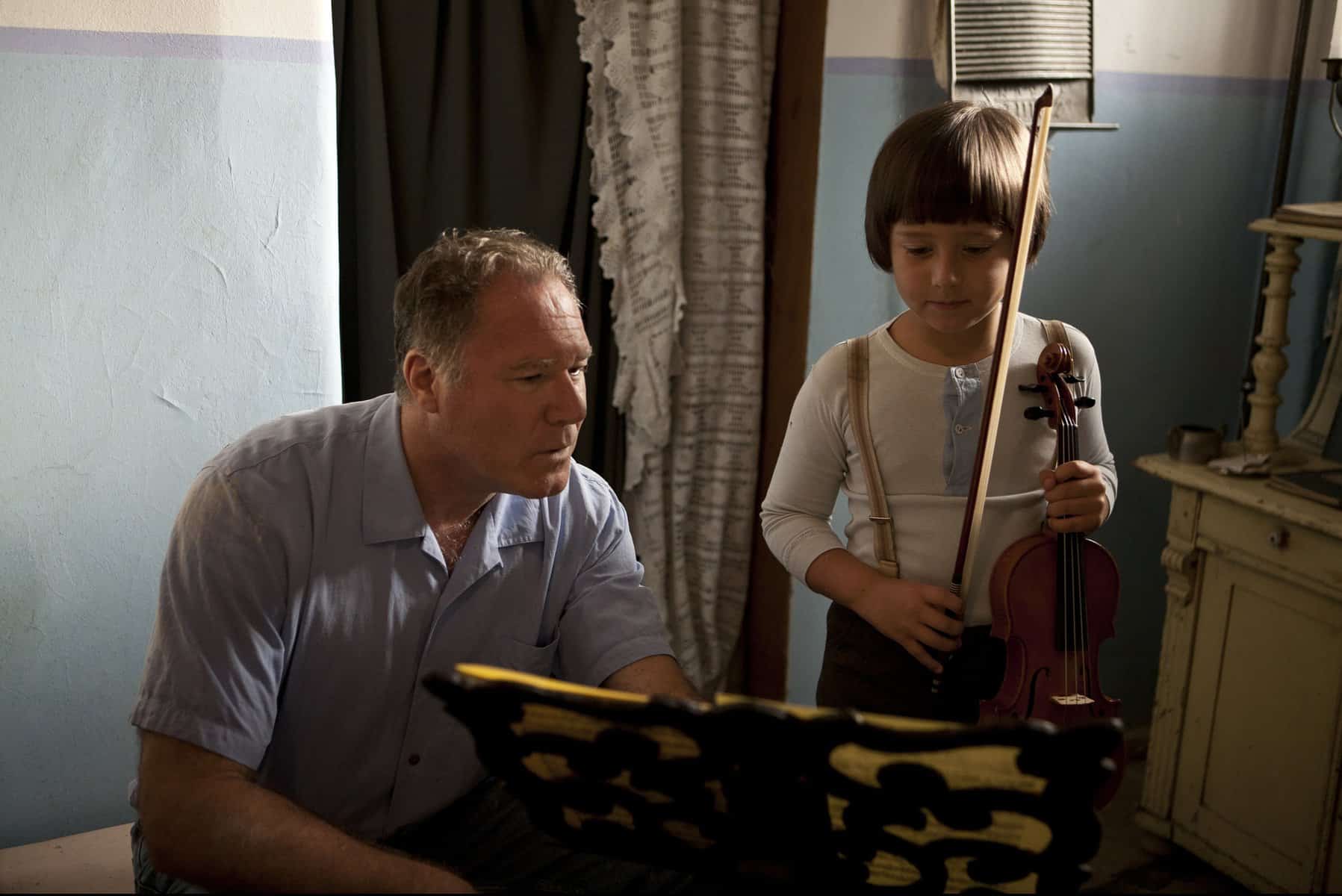
Director Josh Aronson instructs Henk Reinicke as little Broni Huberman in Orchestra of Exiles, a film by Josh Aronson. A first Run Features release. Photo by Irina Trübbecke.
In anticipation of the Israel Philharmonic Orchestra’s performance at the Virginia Arts Festival on April 2, the Community Relations Council and the Holocaust Commission of the United Jewish Federation of Tidewater, with the Simon Family JCC, present the documentary Orchestra of Exiles next week.
The film reveals the integral role that Polish violinist Bronislaw Huberman played in saving the lives of some of Europe’s premiere Jewish musicians from death by the Nazis during World War II . Courageously, and with great risk, Huberman moved these musicians to Palestine and formed the symphony which today is known as one of the best in the world—the Israel Philharmonic.
Orchestra of Exiles’ Academy Award nominated director, Josh Aronson, will attend the documentary’s screening. Following the movie, Aronson will answer audience questions, and discuss Huberman’s impact on the world.
“We’ll share an hour of questions and answers on a wide range of subjects. This film really provokes a lot of interesting talk, and there are a lot of things in the film that people have never heard of,” says Aronson.
“For those planning to see the symphony perform live, I think they’ll come to it with a warm feeling about what this orchestra is and where it came from—what its DNA was. I think seeing this film will definitely enhance their experience.”
Aronson found out about the former child prodigy, whom he calls a hero, through a casual conversation.
“A friend of mine—fellow pianist, Dorit Straus–told me the story of Huberman from the perspective of her father, who is one of the characters in this film and was one of Huberman’s students. Not right away, but eventually, I checked the story out on the internet. It was extraordinary, and I found it unbelievable that no one had ever written a book about Huberman or the founding of the symphony—which is such a great story.”
Aronson spent about three years researching, interviewing, traveling, filming and putting the pieces in place for this compelling documentary. He discovered that Huberman—a celebrity who freely traveled throughout Europe—gave up his craft for two years, at the height of his career, in order to study sociology. This education, Aronson says, enabled Huberman to assess correctly the political situation in Europe in the 1930s.
The violinist convinced musicians who had been fired from their orchestras under an SS edict that the national socialists had dire intentions for the Jews. Huberman’s celebrity, Aronson says, plus the force of his will, convinced these stellar Jewish musicians to move to Palestine, their families in tow.
“Here’s a man who not only brought the culture of central Europe to Palestine, but people are acknowledging that this orchestra was the seed of the culture that grew to what we have in Israel today.”
Fascinating to Aronson, were the images and archival footage of the cultured Europeans, in their dark suits and hats, walking through the hot, desert landscape that was Tel Aviv in the 1930s, sharing the streets with camels.
“To see Israel in those days, and to see what Palestine looked like, it was astonishing. I think it gives a real sense of what Zionism was about, the passion for it and the way that people felt in those days of Israel (or the future Israel), that they went there and formed this incredible orchestra. I think it’s a dose of what the dream was.”
Huberman’s place in Holocaust education, in cultural history, and in Israel’s growth as a flourishing, artistic country and Jewish homeland, should be remembered and celebrated, Aronson believes.
“Huberman was a man who was almost completely unknown. Only musicians had heard of him, and Jewish scholars had heard of him, but in the general zeitgeist, he was an unknown person,” says Aronson.
“It must be remembered that Huberman also saved 1,000 Jews. Schindler saved 1,000 Jews. I mean how could we have forgotten a man who saved 1,000 Jews? And, it was a Jew saving Jews. A very special breed.
“He publicly spoke out about the Nazi’s bias and anti-Semitism. I think he’s a message for the next generation—a very good example for standing up against intolerance and having the courage to be vocal.”
In addition to rarely seen archival footage, original recordings, and reenactments, the film includes interviews with Itzhak Perlman, Zubin Mehta, Pinchas Zukerman, Joshua Bell and others.
Violinist Bell is linked to Huberman in several unexpected ways, and to this film screening as well. Bell, too, performs in the 2014 Virginia Arts Festival, May 2–4.
RSVP requested for Orchestra of Exiles: email lhenderson@ujft.org, or call 757‑965‑6107. For more information about this event, visit JewishVa.org/CRC. For more information about the Virginia Arts Festival, visit www.vafest.org. The Israel Philharmonic Orchestra is a co-presentation of the Arts Festival and the Simon Family JCC; find out more and purchase tickets for the April 2 performance at www.simonfamilyjcc.org.
by Laine Mednick Rutherford

